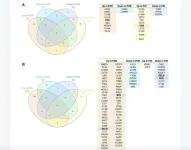(Press-News.org) Beer pong. Quarters. Flip cup. The drinking games college students play can seem like an alcohol-laced version of intramural sports.
When college-aged drinkers imbibe too heavily, the risk for physically harming a romantic partner rises considerably.
What if there was a way for heavy drinkers to monitor their alcoholic intake and blood-alcohol levels in real time, before an intimate situation cascades into physical violence?
Or, as Virginia Tech researcher and assistant professor of psychology Meagan Brem put it: “If we can identify a cut-off where students’ risk for perpetration [of violence] would be highest, we might be able to perform just-in-time delivery of interventions to prevent perpetration.”
Brem, director of the university’s Research for Alcohol and Couples Health Lab and an Institute for Society, Culture, and Environment Scholar, leads a team of Virginia Tech researchers in the development of a study where self-identified heavy drinkers use pocket-sized electronic devices to monitor their drinking habits, alcohol levels, mood, and behavior. The study, initially supported by seed funding from the institute, has recently secured a $434,491 grant from the National Institute on Alcohol Abuse and Alcoholism, commonly called an R21 grant, as part of a National Institutes of Health program to support research projects in the nascent stages of development.
Early this year, Brem and her professional and student colleagues will assemble a group of 100 heavy-drinking men and women students who have self-reported histories of intimate partner violence who will then be expected to report their drinking habits and other information for 30 consecutive days. The study relies on simple methods that require only a hand-held breathalyzer, a smartphone app, and quick daily reports.
Each day during the 30-day study period, participants will receive prompts through their phone at five specific times that will ask them to submit results from the provided breathalyzer and to answer a brief survey about how they feel, when they had their last drink, and other pertinent questions.
Even though participants’ survey answers might be hard to quantify, the breathalyzer information is not. Working closely with co-researcher Warren Bickel, behavioral research professor with Fralin Biomedical Research Institute at VTC whose research has involved the use of breathalyzers, Brem expects to get objective data about student drinking and the likelihood that someone could perpetrate violence against an intimate partner. Studies have shown that adults will often under-report the number of alcoholic beverages they have consumed.
And college students?
“They're especially bad at it,” Brem said.
That’s why breathalyzer data is necessary, she said. The participant blows into the breathalyzer, which connects to a smartphone via Bluetooth to record the numbers.
“We wondered,” Brem said, “can we identify exact blood-alcohol concentration level when there might be the greatest likelihood that they would perpetrate sexual assault or intimate partner violence, sort of in the same way that we do with driving while intoxicated?”
The range of blood alcohol levels among heavy drinkers can be vast. In fact, during a pilot study conducted for this project, Brem’s team found that participants’ blood alcohol concentrations ranged from zero to a staggering 0.25 percent — more than three times the legal limit for driving while intoxicated and dangerously close to alcohol-poisoning levels.
“It's amazing that people are still alive and functioning at that point,” Brem said.
Another reason why breathalyzer data beats self-reported information is because many students simply don’t know how much alcohol constitutes a standard “drink.”
Heavy-drinking college students might be guzzling unknowable amounts of alcohol from bottles, cups, plastic jugs, aluminum pails, even rubber hoses.
“They're drinking directly out of bottles of liquor sometimes or they're drinking a concoction of various high-powered spirits made in large quantities, or mixed drinks,” Brem said. “Even when we give them a definition of a standard drink … they're really poor reporters when it comes to how much they've consumed.”
But the breathalyzer doesn’t lie.
As important as the objective alcohol data is for this study, there is some need for subjective self-reporting, especially when it comes to a heavy drinker’s mood, feelings or behavior toward other people. That’s why the survey’s daily questions are tailored in ways that don’t sound accusatory to the participants.
“For instance,” Brem said, “we will ask, ‘Since the last survey have you yelled at your partner or have you called them names? Have you pushed or shoved your partner?’’”
That method generated eye-popping answers during the pilot study. Fifty-four percent of the participants reported at least one intimate partner violence event during that study’s 28-day period.
Brem’s team takes a broad view when it comes to intimate partner violence, considering not only physical altercations, but online and technology-based violence, such as cyberstalking, bullying or making threats on social media.
This broader perspective also shifts the common narratives around intimate violence. Sexual perpetrators are often men, as research has shown for years, but men suffer the same rates of physical and psychological harm as women, Brem said. However, even in those cases where abuse rates are similar, women sustain more negative consequences.
“We do see that women are more likely to experience a greater severity of negative repercussions after the IPV,” Brem said, “meaning they need more resources such as shelter or financial support. They're more likely to miss work, they're more likely to experience mental health symptoms.”
Which means that Brem’s project has potential real-world societal and economic implications when it comes to reducing alcohol-related domestic violence and the societal costs required to handle the consequences — whether they be in healthcare, the judicial system, rehabilitation, workplaces, or other social safety-net programs.
The more information the public has, the better prepared it will be to prevent domestic violence and mitigate the fallout, according to TJ Shaw, a Ph.D. candidate and research assistant helping guide the data collection.
“We want to find out if this study is a way to get more information from college students who are at risk for this,” Shaw said. “We need to know if we can design an intervention system to reduce the likelihood of violence before it happens.”
END
Meagan Brem and team receive grant to study alcohol-fueled acts of violence among intimate partners
2024-01-09
ELSE PRESS RELEASES FROM THIS DATE:
Unlocking the secrets of a "hot Saturn" and its spotted star
2024-01-09
Led by researchers from Université de Montréal's Trottier Institute for Research on Exoplanets (iREx), a team of astronomers has harnessed the power of the revolutionary James Webb Space Webb Telescope (JWST) to study the "hot Saturn" exoplanet HAT-P-18 b.
Their findings, published last month in the journal Monthly Notices of the Royal Astronomical Society, paint a complete picture of the HAT-P-18 b's atmosphere while exploring the great challenge of distinguishing its atmospheric signals from the activity of its star.
HAT-P-18 b is located over 500 light-years away ...
RSV shown to infect nerve cells, cause inflammation and damage
2024-01-09
Respiratory syncytial virus (RSV), a common infection in children and senior adults, can also infect nerve cells and trigger inflammation leading to nerve damage, according to a new Tulane University study.
RSV can cause mild symptoms such as coughing, sneezing and fever or lead to more severe conditions such as pneumonia or bronchiolitis. But since the disease was first discovered in 1956, it has been thought to only infect the respiratory tract.
This study, published in The Journal of Infectious Diseases, is the first to prove that RSV can penetrate nerve cells and may provide the ...
A common marker of neurological diseases may play role in healthy brains
2024-01-09
https://www.ninds.nih.gov/news-events/press-releases/common-marker-neurological-diseases-may-play-role-healthy-brainsResearchers have discovered that a protein called phosphorylated α-synuclein, which is associated with several neurodegenerative diseases such as Parkinson’s disease and Lewy body dementia, is also involved in the normal processes of how neurons communicate with each other in a healthy brain. The research, published in Neuron, was funded in part by the National Institute of Neurological Disorders and Stroke (NINDS), a part of the National Institutes of Health.
Phosphorylation is a process where a phosphate ...
ChatGPT poem regurgitation raises ethical questions
2024-01-09
ITHACA, N.Y. – Ask ChatGPT to find a well-known poem and it will probably regurgitate the entire text verbatim – regardless of copyright law – according to a new study by Cornell University researchers.
The study showed that ChatGPT was capable of “memorizing” poems, especially famous ones commonly found online. The findings pose ethical questions about how ChatGPT and other proprietary artificial intelligence models are trained – likely using data scraped from the internet, researchers said.
“It’s generally not good for large language models to memorize large chunks of text, in part because it’s a privacy concern,” ...
Sickle cell raises COVID-19 risk, but vaccination lags
2024-01-09
Despite the fact that people with sickle cell disease have a much higher risk of serious illness or death if they develop COVID-19, a new study shows they’re also much less likely than those without sickle cell disease to have gotten vaccinated against coronavirus.
Completion of the initial COVID-19 vaccination series was nearly two times lower for adults with sickle cell disease as others their age, the analysis of data in Michigan shows.
In in teens and children over 5, who overall have lower rates of COVID-19 vaccination, those with sickle cell disease were far less likely than other young people to have gotten their doses by summer 2022, the analysis ...
Brookline Housing Authority partners with Hebrew SeniorLife for health and social services in senior housing
2024-01-09
The Brookline Housing Authority (BHA) has partnered with Hebrew SeniorLife, New England’s largest nonprofit provider of senior health care and living communities, and the only senior care organization affiliated with Harvard Medical School, to provide community life services including resident services, fitness, social programming, and nursing in BHA’s senior housing sites.
Hebrew SeniorLife brings to the BHA its model of housing with services called the Right Care, Right Place, Right Time (R3) program. This model uses a preventive approach to resident services, focused on one-on-one relationship building, community-wide ...
Sylvester-led research group unveils the first individual risk prediction model for multiple myeloma
2024-01-09
MIAMI, FLORIDA (EMBARGOED UNTIL JAN. 9, 2024 AT 4 PM EST) – A multicenter collaboration led by researchers at Sylvester Comprehensive Cancer Center at the University of Miami Miller School of Medicine has produced the first computational model for newly diagnosed multiple myeloma that predicts an individual’s personalized prognosis based on their tumor genomics and treatments.
The prediction model for individualized risk in newly diagnosed multiple myeloma, or IRMMa, improves on previous prognostic tools because it takes into account ...
Systemic changes induced by ASCOT in plasma proteome of women with impaired ovarian reserves
2024-01-09
“Identifying plasma proteins that regenerate aged or damaged ovaries could lead to more effective, targeted and/or preventive therapies for patients.”
BUFFALO, NY- January 9, 2024 – A new research paper was published in Aging (listed by MEDLINE/PubMed as "Aging (Albany NY)" and "Aging-US" by Web of Science) Volume 15, Issue 24, entitled, “Systemic changes induced by autologous stem cell ovarian transplant in plasma proteome of women with impaired ovarian reserves.”
Patients with poor ...
Green wheels, bright skies: NREL analysis unveils the connection between electric vehicles and photovoltaics
2024-01-09
People who own electric vehicles (EVs) are more likely to go a step further and add solar panels to their home, according to an analysis of a behavioral study by researchers at the U.S. Department of Energy’s National Renewable Energy Laboratory (NREL). Conversely, the impact of owning solar panels also has a bearing on whether a homeowner buys an electric vehicle but not as strongly.
The study relied on a survey of 869 households in the San Francisco Bay Area.
NREL’s Shivam Sharda, lead author of the newly published research paper that analyzes the ...
V Foundation grant enables research on radiation resistance in pancreatic cancer treatment
2024-01-09
University of Colorado Cancer Center member Sana Karam, MD, PhD, has received a translational research grant from the V Foundation for Cancer Research, co-founded by ESPN and legendary basketball coach Jim Valvano, to study a new therapeutic that may help pancreatic cancer patients overcome resistance to radiation therapy.
“Pancreatic cancer is deadly. The only treatment that can cure it is surgery to fully remove the tumor, but that is only an option when the cancer is caught early, which is rare,” Karam explains. “Radiation alone to shrink tumors before surgery has been tried, but with limited benefit. By studying patient ...





